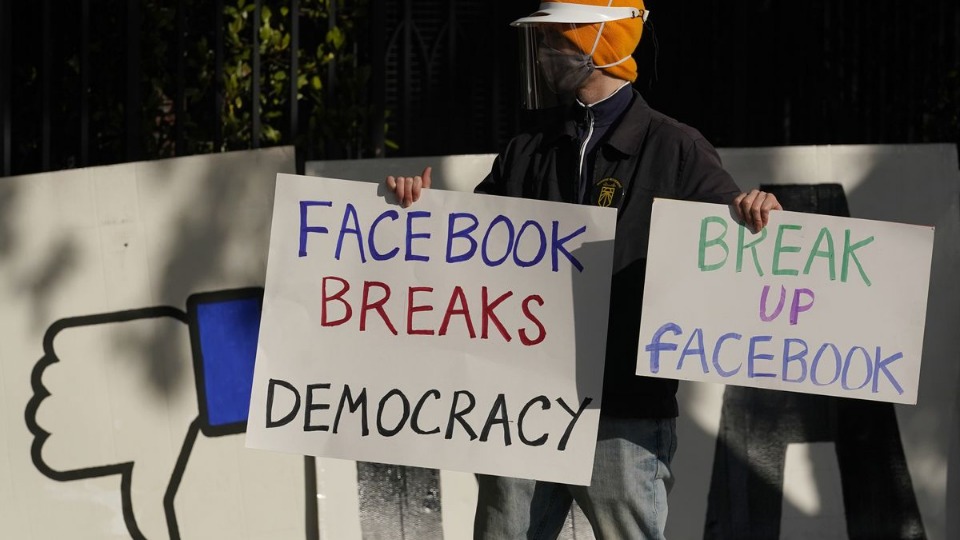
Coming on the heels of a Justice Department lawsuit against Google filed in October, social networking giant Facebook is now in the crosshairs of the trustbusters at the Federal Trade Commission and a coalition of more than 48 state and territorial governments. Anti-monopoly momentum is picking up as regulators, long regarded as asleep at the wheel, are escalating legal action against companies that have virtually eliminated competition in the digital economy.
If these latest prosecution efforts are successful, billionaire Mark Zuckerberg’s social media empire could be broken up, with photo sharing platform Instagram and messaging application WhatsApp split off into separate companies. Following that, new restrictions would be put in place on any future acquisitions by Facebook.
The moves are aimed at restoring competition to a sector in which power and market share have been increasingly centralized and concentrated within the hands of a few digital behemoths. Without the intervention of left and working-class voices, however, the anti-monopoly effort against the tech giants could result in simply a shoring up of the primary dynamics of capitalism and no real shift toward a democratically-controlled economy.

Digital predator
In dual cases filed Dec. 9, the FTC and state regulators argue Facebook’s 2012 buyout of Instagram for $1 billion and its purchase of WhatsApp two years later for $19 billion were intentional efforts to eliminate competition to the company’s control over social networking. The deals left Facebook dominating three of the most popular and widely used social media and messaging platforms in the world and helped send the company’s value soaring to more than $800 billion.
The multistate offensive is being led by New York Attorney General Letitia James. “For nearly a decade, Facebook has used its dominance and monopoly power to crush smaller rivals and snuff out competition, all at the expense of everyday users,” she said when announcing the suit on Wednesday.
James painted a picture of Zuckerberg’s company as a predator engorged with cash and user information and determined to swallow every conceivable rival. “By using its troves of data and money, Facebook has squashed or hindered what the company perceived as threats,” she said. The company, according to James, “sent a clear message to the industry: Don’t step on Facebook’s turf.” She said one tech executive told her they didn’t dare risk incurring “the wrath of Mark.”
The FTC’s separate case in federal court alleges Facebook has built and maintained its monopoly position “by buying up companies that present competitive threats and by imposing restrictive policies that unjustifiably hinder actual or potential rivals that Facebook does not or cannot acquire.”
It requests a permanent injunction from the court on such practices and an order for the “divestiture of assets or reconstruction of businesses”—in other words, bust the Facebook trust.
Trustbuster revival?
Should the court grant FTC’s request, it would be one of the biggest company break-ups since the late 19th and early 20th centuries’ first wave of anti-monopoly movements. At that time, gigantic industrial concerns like Standard Oil were dissolved, though monopolist practices often re-emerged in the form of cartels.
During the Great Depression, tens of millions of people angered by home and farm foreclosures and business bankruptcies forced the government to act against the big banks which were seen as responsible for the financial casino that crashed the economy. Later regulatory campaigns went after railroads and utilities.
The government’s legal efforts to restrain monopolist practices have ebbed and flowed over the decades since, with cases sometimes dragging on for years but little actually changing in the economic functioning of the industries targeted. Economist Victor Perlo wrote in the 1980s that such cases generally “served as a political showcase for the supposedly democratic process of curbing monopoly.”
At the time, he pointed to the 1970s antitrust suits against IBM and AT&T. Both, according to Perlo, were cases that “masked battles for position among competing monopolies.” Smaller rivals wanted to improve their own market share and weaken the giants. In the case of IBM, the lawsuit failed, resulting in an even more intense effort to decimate smaller computer makers. AT&T, whose price-gouging had angered people across the country, met a different fate. It was broken into eight separate companies, although the net effect was just a re-division of profits and no substantial savings for consumers.
A 1998 Justice Department lawsuit against Microsoft was the first (and until recently, only) major antitrust enforcement action in the era of the digital economy. At the time, the government alleged that Bill Gates’ company had a stranglehold over the software industry, pointing to the way it forced computer manufacturers to install its Internet Explorer as the default web browser on their products. Initially, a court agreed with the government and ordered Microsoft be split up, but a successful appeal by the company led the DOJ to cut a deal.
That was the last significant intervention until the Trump administration pulled a pre-election stunt in late October by announcing it was pursuing a suit against Google parent company Alphabet. Attorney General Bill Barr filed the case in an attempt to portray the outgoing president as a populist enemy of big business. Barr jumped the gun on a more extensive investigation that has been piling up evidence against Google for well over a year, potentially putting that case in jeopardy.
Wall Street barely budged in response to the threat at the time, with Alphabet shares relatively flat following Barr’s announcement. Investors appear to be showing similar concern around the Facebook case; the stock price for the company has hovered 3-4% lower since the case filings.
This is at least partially a reflection of how tough it’s going to be for the FTC and the states to prove their arguments. Diana Moss, who heads up the American Antitrust Institute, told the New York Times on Wednesday that winning the cases is “going to be a challenge” for the trustbusters. In July 2019, her organization issued a report that scoured regulators for years of lax monopoly monitoring and paltry merger enforcement.
That failure of regulators to regulate is the biggest counterpoint Facebook has in its favor. In 2012 and 2014, the FTC itself allowed Facebook to proceed with its acquisitions of Instagram and WhatsApp, seeing no monopoly problem at the time. The government will surely be required by courts to prove why things are different now.
Another part of Facebook’s defense will be that unlike historical “buy and bury” practices of the past when companies bought out rivals and essentially eliminated their operations or merged them into their own, Instagram and WhatsApp have been cultivated for further growth with massive new investment into them. The recent efforts by the company to integrate user communications between the three platforms may undermine that argument, however.
Saving capitalism from itself
Regardless of the specifics of how the case plays out down the road, for the moment, the anti-monopoly campaign serves the broader political purposes of an economic ruling class feeling the pressure from a public increasingly interested in socialist ideas and inclined to rhetoric skeptical of unbridled capitalism. The economic depression brought on by the global coronavirus pandemic has accelerated a crisis of faith in the status quo for millions who are jobless or have lost loved ones.
The fact that the tech monopolies like Facebook, Amazon, Google, and Apple have reaped whirlwind profits from the pandemic makes them obvious targets. And that’s why this is all a relatively bipartisan affair in the midst of what is otherwise a moment of intense polarization. New York AG James is a Democrat, but the FTC’s anti-monopoly charge is being headed by its Republican Trump-appointed chair, Joe Simons.
Showcasing the wider legitimacy threat the tech titans pose to capitalism’s window dressing of open competition and its ideologues’ professed commitment to free markets, FTC antitrust enforcer Ian Conner declared the aim of the lawsuit “is to roll back Facebook’s anticompetitive conduct and restore competition so that innovation and free competition can thrive.” (How many times and ways can one say competition in the same short sentence?)
The Facebook cases have sparked a competition among lawmakers to see who can proclaim their anti-monopoly credentials the loudest. GOP Congressman Ken Buck of Colorado tweeted that “Big Tech’s reckoning has just begun.” And Rep. David Cicilline, a Rhode Island Democrat, declared bluntly, “Facebook has broken the law. It must be broken up.”
But with the courts potentially taking years to wade through the lawsuits and the absolute best potential outcome being the creation of a few more tech giants if Facebook is actually split up, the question must be asked, what will have been achieved?
We are being told that government intervention is necessary now in order to restore the competitive private economy, one free of state interference or monopoly abuse. It all serves to illuminate the role of the government in what used to be called “state monopoly capitalism,” in which the state alternates between free market authoritarianism and interventionism—or in more contemporary terms, neoliberalism and Keynesianism. Though they appear contradictory, both are aimed at stabilizing the economy in the interest of the capitalist class as a whole, even if that means acting against the interests of individual capitalists—like Mark Zuckerberg.

Thus, the Facebook trustbusting lawsuits are functionally a means of shoring up the system. One of the most well-known analysts of state monopoly capitalism, V.I. Lenin, wrote that until the “shell” of private property is removed from these massive companies, their true potential to serve all of society will be hindered.
That’s the point on which the working-class, left, and progressive movements must enter the fray. The pressure from the top will be to steer these antitrust lawsuits toward an outcome which may weaken one single company’s position but strengthen capitalism and its ideology overall.
The anti-monopoly effort against Facebook, Google, and the rest should be supported without hesitation, but new questions and possibilities must be added to the conversation. Rather than only highlighting Facebook’s abuses of industry rivals, more attention must be placed on how its practices impact everyday consumers and workers.
Impacts on app users get considerable attention, but there has been almost no discussion of the class dynamics at work—whether in the tech development, product manufacturing, delivery, and logistics, or wealth accumulation aspects of digital capitalism.
In its current form, the anti-monopoly campaign is aimed at regulating the system for the benefit of capital; the task ahead is to transform it into an effort to regulate and control the tech economy in the interests of the whole society.
Further reading:
> Empire of High Technology: Amazon, Apple, Google, Facebook achieve ‘monopoly power’
> Trump’s Google antitrust lawsuit: Blow against monopoly or political theater?












Comments